COS Company's Sustainability Policy: Promoting Environmental Practices
VerifiedAdded on 2023/06/07
|5
|862
|188
Essay
AI Summary
This essay presents COS Company's sustainability policy, focusing on ecological, economic, and social dimensions. The policy aims to reduce water and energy use, promote renewable energy sources, and limit greenhouse gas emissions. Key initiatives include creating a 'green discount' for environmentally friendly products, essay contests in learning institutions, and collaboration with environmentally conscious suppliers. The implementation involves raising awareness, training employees, and allocating resources for recycling and emissions reduction. The policy emphasizes integrating sustainable development into all company activities, fostering environmental consciousness among stakeholders, and establishing a system for monitoring and reporting environmental performance. The document concludes with authorization details and a list of references.
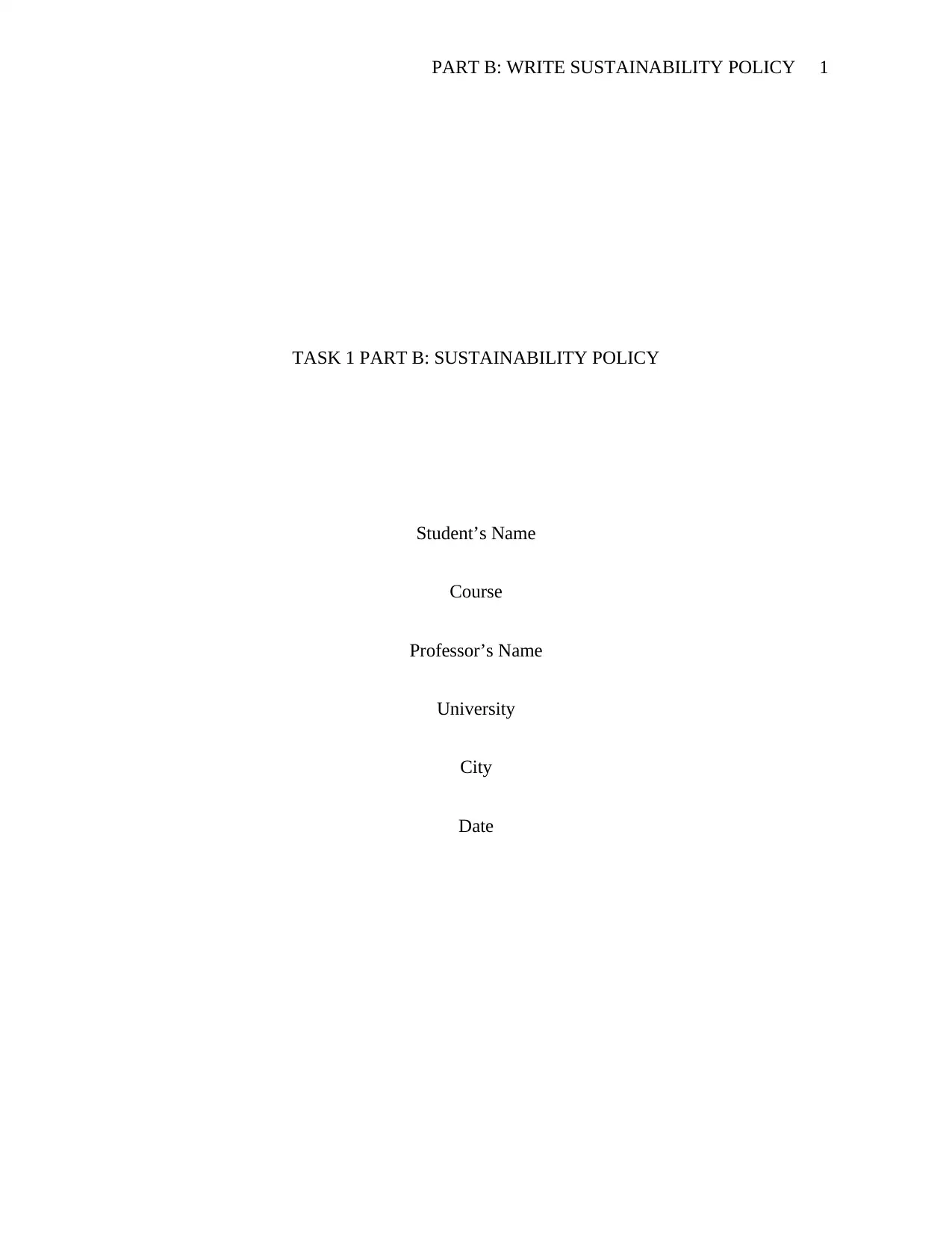
PART B: WRITE SUSTAINABILITY POLICY 1
TASK 1 PART B: SUSTAINABILITY POLICY
Student’s Name
Course
Professor’s Name
University
City
Date
TASK 1 PART B: SUSTAINABILITY POLICY
Student’s Name
Course
Professor’s Name
University
City
Date
Paraphrase This Document
Need a fresh take? Get an instant paraphrase of this document with our AI Paraphraser
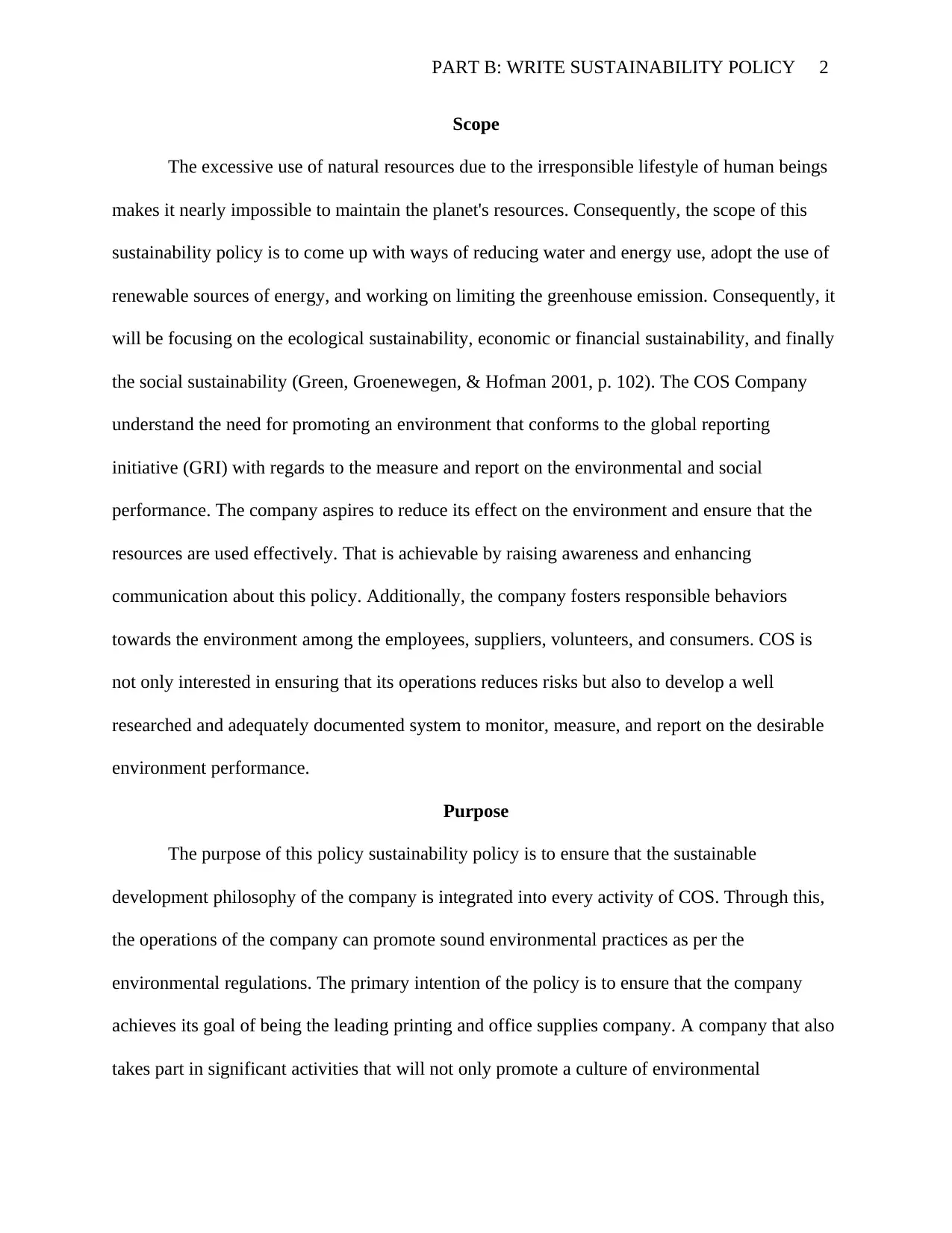
PART B: WRITE SUSTAINABILITY POLICY 2
Scope
The excessive use of natural resources due to the irresponsible lifestyle of human beings
makes it nearly impossible to maintain the planet's resources. Consequently, the scope of this
sustainability policy is to come up with ways of reducing water and energy use, adopt the use of
renewable sources of energy, and working on limiting the greenhouse emission. Consequently, it
will be focusing on the ecological sustainability, economic or financial sustainability, and finally
the social sustainability (Green, Groenewegen, & Hofman 2001, p. 102). The COS Company
understand the need for promoting an environment that conforms to the global reporting
initiative (GRI) with regards to the measure and report on the environmental and social
performance. The company aspires to reduce its effect on the environment and ensure that the
resources are used effectively. That is achievable by raising awareness and enhancing
communication about this policy. Additionally, the company fosters responsible behaviors
towards the environment among the employees, suppliers, volunteers, and consumers. COS is
not only interested in ensuring that its operations reduces risks but also to develop a well
researched and adequately documented system to monitor, measure, and report on the desirable
environment performance.
Purpose
The purpose of this policy sustainability policy is to ensure that the sustainable
development philosophy of the company is integrated into every activity of COS. Through this,
the operations of the company can promote sound environmental practices as per the
environmental regulations. The primary intention of the policy is to ensure that the company
achieves its goal of being the leading printing and office supplies company. A company that also
takes part in significant activities that will not only promote a culture of environmental
Scope
The excessive use of natural resources due to the irresponsible lifestyle of human beings
makes it nearly impossible to maintain the planet's resources. Consequently, the scope of this
sustainability policy is to come up with ways of reducing water and energy use, adopt the use of
renewable sources of energy, and working on limiting the greenhouse emission. Consequently, it
will be focusing on the ecological sustainability, economic or financial sustainability, and finally
the social sustainability (Green, Groenewegen, & Hofman 2001, p. 102). The COS Company
understand the need for promoting an environment that conforms to the global reporting
initiative (GRI) with regards to the measure and report on the environmental and social
performance. The company aspires to reduce its effect on the environment and ensure that the
resources are used effectively. That is achievable by raising awareness and enhancing
communication about this policy. Additionally, the company fosters responsible behaviors
towards the environment among the employees, suppliers, volunteers, and consumers. COS is
not only interested in ensuring that its operations reduces risks but also to develop a well
researched and adequately documented system to monitor, measure, and report on the desirable
environment performance.
Purpose
The purpose of this policy sustainability policy is to ensure that the sustainable
development philosophy of the company is integrated into every activity of COS. Through this,
the operations of the company can promote sound environmental practices as per the
environmental regulations. The primary intention of the policy is to ensure that the company
achieves its goal of being the leading printing and office supplies company. A company that also
takes part in significant activities that will not only promote a culture of environmental
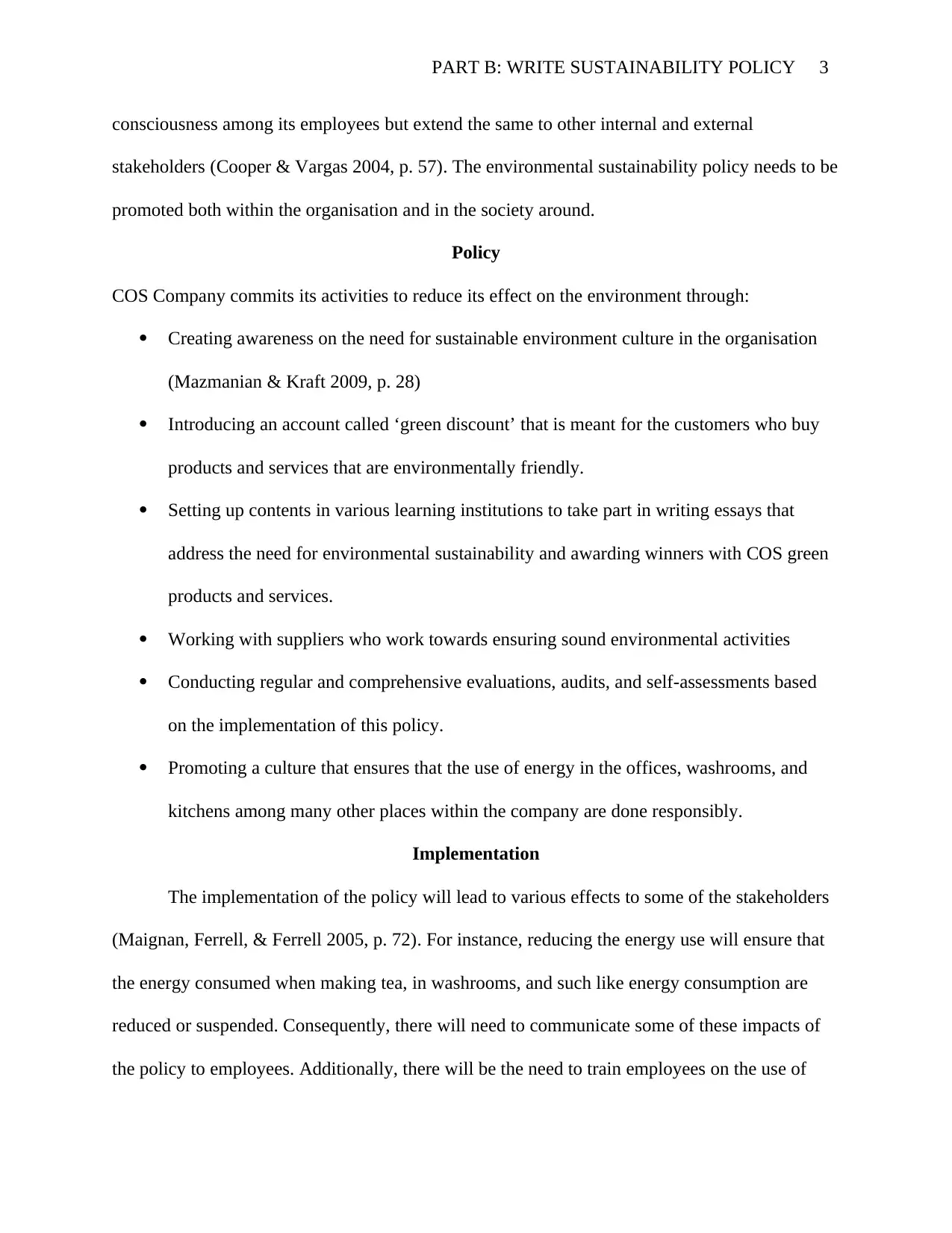
PART B: WRITE SUSTAINABILITY POLICY 3
consciousness among its employees but extend the same to other internal and external
stakeholders (Cooper & Vargas 2004, p. 57). The environmental sustainability policy needs to be
promoted both within the organisation and in the society around.
Policy
COS Company commits its activities to reduce its effect on the environment through:
Creating awareness on the need for sustainable environment culture in the organisation
(Mazmanian & Kraft 2009, p. 28)
Introducing an account called ‘green discount’ that is meant for the customers who buy
products and services that are environmentally friendly.
Setting up contents in various learning institutions to take part in writing essays that
address the need for environmental sustainability and awarding winners with COS green
products and services.
Working with suppliers who work towards ensuring sound environmental activities
Conducting regular and comprehensive evaluations, audits, and self-assessments based
on the implementation of this policy.
Promoting a culture that ensures that the use of energy in the offices, washrooms, and
kitchens among many other places within the company are done responsibly.
Implementation
The implementation of the policy will lead to various effects to some of the stakeholders
(Maignan, Ferrell, & Ferrell 2005, p. 72). For instance, reducing the energy use will ensure that
the energy consumed when making tea, in washrooms, and such like energy consumption are
reduced or suspended. Consequently, there will need to communicate some of these impacts of
the policy to employees. Additionally, there will be the need to train employees on the use of
consciousness among its employees but extend the same to other internal and external
stakeholders (Cooper & Vargas 2004, p. 57). The environmental sustainability policy needs to be
promoted both within the organisation and in the society around.
Policy
COS Company commits its activities to reduce its effect on the environment through:
Creating awareness on the need for sustainable environment culture in the organisation
(Mazmanian & Kraft 2009, p. 28)
Introducing an account called ‘green discount’ that is meant for the customers who buy
products and services that are environmentally friendly.
Setting up contents in various learning institutions to take part in writing essays that
address the need for environmental sustainability and awarding winners with COS green
products and services.
Working with suppliers who work towards ensuring sound environmental activities
Conducting regular and comprehensive evaluations, audits, and self-assessments based
on the implementation of this policy.
Promoting a culture that ensures that the use of energy in the offices, washrooms, and
kitchens among many other places within the company are done responsibly.
Implementation
The implementation of the policy will lead to various effects to some of the stakeholders
(Maignan, Ferrell, & Ferrell 2005, p. 72). For instance, reducing the energy use will ensure that
the energy consumed when making tea, in washrooms, and such like energy consumption are
reduced or suspended. Consequently, there will need to communicate some of these impacts of
the policy to employees. Additionally, there will be the need to train employees on the use of
⊘ This is a preview!⊘
Do you want full access?
Subscribe today to unlock all pages.

Trusted by 1+ million students worldwide
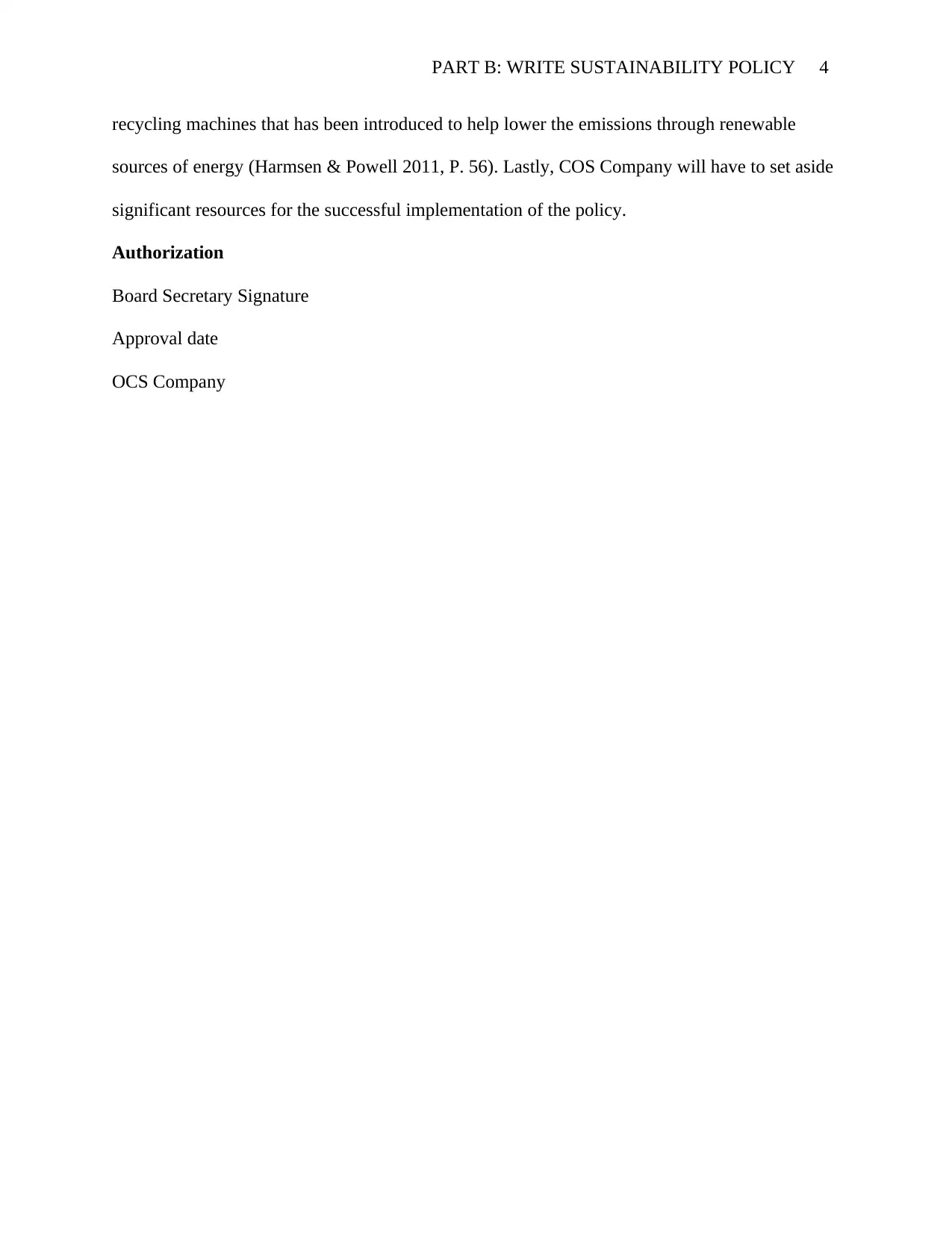
PART B: WRITE SUSTAINABILITY POLICY 4
recycling machines that has been introduced to help lower the emissions through renewable
sources of energy (Harmsen & Powell 2011, P. 56). Lastly, COS Company will have to set aside
significant resources for the successful implementation of the policy.
Authorization
Board Secretary Signature
Approval date
OCS Company
recycling machines that has been introduced to help lower the emissions through renewable
sources of energy (Harmsen & Powell 2011, P. 56). Lastly, COS Company will have to set aside
significant resources for the successful implementation of the policy.
Authorization
Board Secretary Signature
Approval date
OCS Company
Paraphrase This Document
Need a fresh take? Get an instant paraphrase of this document with our AI Paraphraser
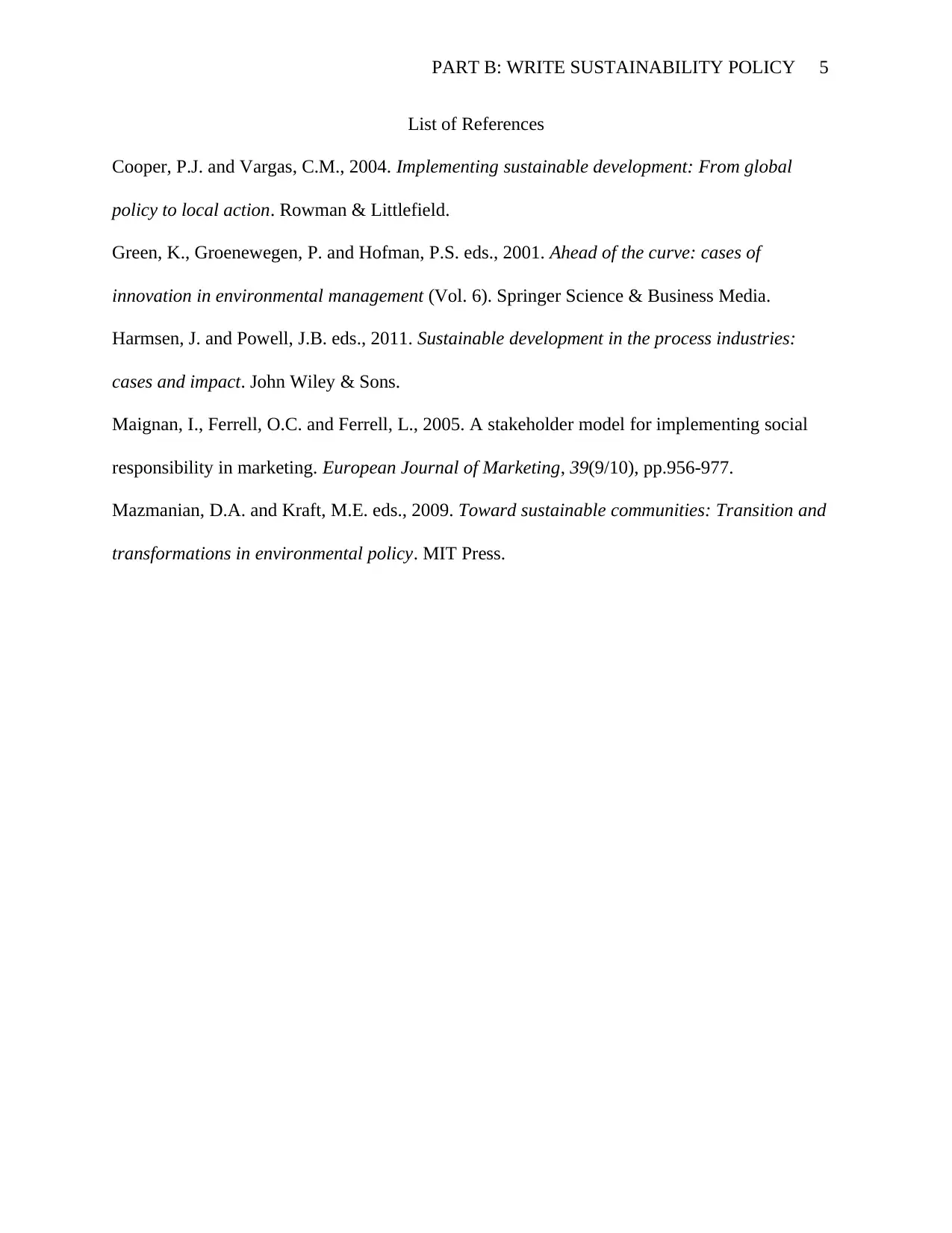
PART B: WRITE SUSTAINABILITY POLICY 5
List of References
Cooper, P.J. and Vargas, C.M., 2004. Implementing sustainable development: From global
policy to local action. Rowman & Littlefield.
Green, K., Groenewegen, P. and Hofman, P.S. eds., 2001. Ahead of the curve: cases of
innovation in environmental management (Vol. 6). Springer Science & Business Media.
Harmsen, J. and Powell, J.B. eds., 2011. Sustainable development in the process industries:
cases and impact. John Wiley & Sons.
Maignan, I., Ferrell, O.C. and Ferrell, L., 2005. A stakeholder model for implementing social
responsibility in marketing. European Journal of Marketing, 39(9/10), pp.956-977.
Mazmanian, D.A. and Kraft, M.E. eds., 2009. Toward sustainable communities: Transition and
transformations in environmental policy. MIT Press.
List of References
Cooper, P.J. and Vargas, C.M., 2004. Implementing sustainable development: From global
policy to local action. Rowman & Littlefield.
Green, K., Groenewegen, P. and Hofman, P.S. eds., 2001. Ahead of the curve: cases of
innovation in environmental management (Vol. 6). Springer Science & Business Media.
Harmsen, J. and Powell, J.B. eds., 2011. Sustainable development in the process industries:
cases and impact. John Wiley & Sons.
Maignan, I., Ferrell, O.C. and Ferrell, L., 2005. A stakeholder model for implementing social
responsibility in marketing. European Journal of Marketing, 39(9/10), pp.956-977.
Mazmanian, D.A. and Kraft, M.E. eds., 2009. Toward sustainable communities: Transition and
transformations in environmental policy. MIT Press.
1 out of 5
Related Documents
Your All-in-One AI-Powered Toolkit for Academic Success.
+13062052269
info@desklib.com
Available 24*7 on WhatsApp / Email
![[object Object]](/_next/static/media/star-bottom.7253800d.svg)
Unlock your academic potential
Copyright © 2020–2026 A2Z Services. All Rights Reserved. Developed and managed by ZUCOL.





